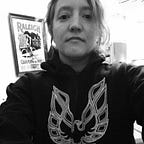Good Girls Marry Doctors
In “Without Shame,” Ayesha Mattu’s essay in Good Girls Marry Doctors: South Asian American Daughters on Obedience and Rebellion (Aunt Lute Books), the Pakistani-American author writes of time spent doing post-collegiate human rights work in Pakistan: “In Pakistan, I also discovered that I was not, as Abu had insisted, ‘only Pakistani.’ My hyphenated existence needn’t be a fault line running through my soul, or a side to be chosen. I was teeming with multitudes, histories, and deep roots. I was blessed, complete. I claimed both countries for myself and swallowed them whole.” In “Modern Mythologies,” another essay in the same collection, Surya Kundu discusses both the Hindu legend of Sita, who allows herself to be swallowed by the earth rather than face further examination by her husband Rama, and the Bengali tradition of venerating powerful goddesses such as Durga and Kali, both of whom aided the gods in battle: “Our mythology tells us two things: Women who are unnecessarily asked to prove their worth prefer death by chasm, and women who break norms and dare do what men can’t are the saviors of mankind. Forced submission kills while the daring are celebrated. As we celebrate our goddesses though, Indian daughters everywhere are asked to be Sita. They are told to respect and revere strength but expected to fear the unfamiliar. We pray one way but practice another.” Later in the essay, Kundu discusses how she has come to choose her own definitions and states: “Most of all, I choose my culture, not out of obligation or fear, but as it can be redefined by me.”
The theme of existing, surviving, and thriving within multiple cultures, and navigating the conflicts that can arise with parents, other South Asian community members, and even within the self as a result, is the glue that holds the myriad essays in Good Girls Marry Doctors together. Edited by writer and educator Piyali Bhattacharya, the collection includes essays by creative writers, journalists, activists, and other women united by the shared experience of growing up in the United States with South Asian immigrant parents from a variety of ethnic and religious backgrounds. The essays discuss everything from what it feels like to face pressure from both parents and community to settle down, marry, and start a family, to parental expectations about career choice, to the specific ramifications of both obedience and rebellion within South Asian immigrant families, and much, much more. In fact, it is the wide scope and breadth of the project that lends the collection its power, as the various essayists describe both struggles and triumphs, disappointments and satisfactions, frustrations and joys. And though Good Girls Marry Doctors is first and foremost a collection that provides insight into parental-daughter (and community-daughter dynamics) within the South Asian-American immigrant community, it is also a vital document in the more general literature of the complexity of familial love. Thus, Good Girls Marry Doctors may serve both to mirror the lived experiences of American daughters of South Asian immigrant parents as well as to challenge readers of other origins to examine the intricacies of the emotional entanglements and bonds of their own natal families.
